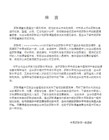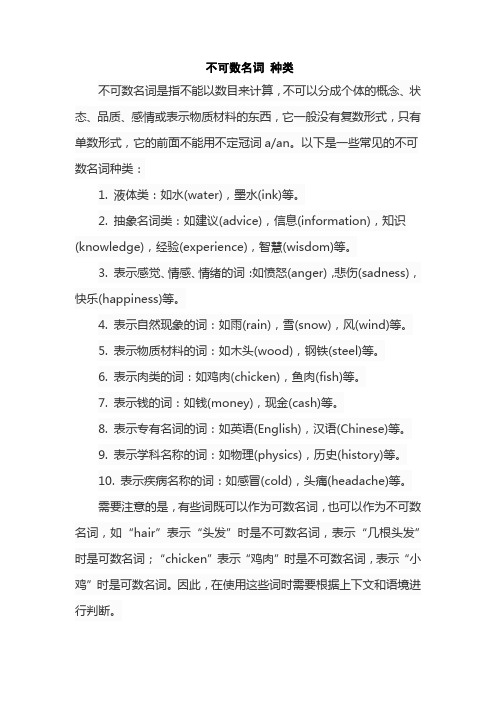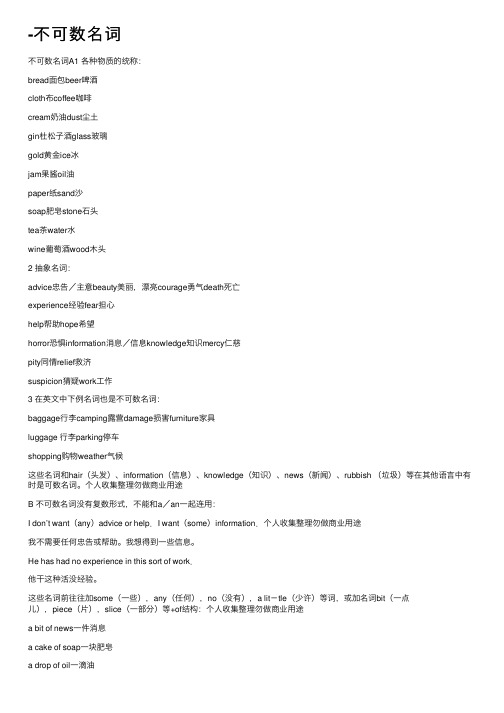不可数的抽象名词
可数名词与不可数名词

religion respect safety security silence
sleep strength status technology time
trade training transport travel trust
information
experience
architecture 不可数,(建筑学,建筑风格)
英语中的不可数名词主要有三类:表示“类”的集体名词、抽象名词、物质名词
⑴表示“类”的集体名词,常见的有
clothing
furniture
baggage/luggage
absence access age agriculture anger
beauty behavior cancer capacity childhood
comfort concern confidence courage death
democracy depression design duty economy
truth violence waste wealth weather
welfare work worth youth
(3)物质名词
1.气体:air(空气),gas(煤气),smoke(烟),steam[sti:m](蒸气),oxygen[>&ksid{+n](氧),hydrogen[>haidr+d{+n](氢),etc.
insurance intelligence joy justice labour
loneliness love luck magic marriage
不可数名词 种类

不可数名词种类
不可数名词是指不能以数目来计算,不可以分成个体的概念、状态、品质、感情或表示物质材料的东西,它一般没有复数形式,只有单数形式,它的前面不能用不定冠词a/an。
以下是一些常见的不可数名词种类:
1. 液体类:如水(water),墨水(ink)等。
2. 抽象名词类:如建议(advice),信息(information),知识(knowledge),经验(experience),智慧(wisdom)等。
3. 表示感觉、情感、情绪的词:如愤怒(anger),悲伤(sadness),快乐(happiness)等。
4. 表示自然现象的词:如雨(rain),雪(snow),风(wind)等。
5. 表示物质材料的词:如木头(wood),钢铁(steel)等。
6. 表示肉类的词:如鸡肉(chicken),鱼肉(fish)等。
7. 表示钱的词:如钱(money),现金(cash)等。
8. 表示专有名词的词:如英语(English),汉语(Chinese)等。
9. 表示学科名称的词:如物理(physics),历史(history)等。
10. 表示疾病名称的词:如感冒(cold),头痛(headache)等。
需要注意的是,有些词既可以作为可数名词,也可以作为不可数名词,如“hair”表示“头发”时是不可数名词,表示“几根头发”时是可数名词;“chicken”表示“鸡肉”时是不可数名词,表示“小鸡”时是可数名词。
因此,在使用这些词时需要根据上下文和语境进行判断。
以上是关于不可数名词的一些常见种类,希望对你有所帮助。
抽象名词具体化可数不可数

honor 荣耀an honor一个(件)引以为荣的(事)(1)一般说来抽象名词为不可数名词,但当抽象名词表示具体的东西时,可用作可数名词且词义发生变化,主要类型如下:①抽象名词表示具有某种特性、状态、感情情绪的人或事。
如:抽象名词(不可数)具体化(个体名词,可数名词)in surprise惊讶地a surprise一件令人惊讶的事win success获得成功a success一个(件)成功的人(事)win honor赢得荣誉an honor一个(件)引以为荣的(事)Failure(失败)is the mother of success a failure失败者失败是成功之母。
by experience靠经验an experience一次经历youth青春a youth一个青年人have pity on sb.怜悯某人a pity可惜的事情with pleasure乐意a pleasure乐事②抽象名词与a(an)连用,淡化了抽象概念,转化为似乎可以体验到的动作、行为或类别。
如:A knowledge of English is a must in international trade.Would you like to have a walk(swim, bath, talk)with me?It is waste of time reading such a novel.She made an apology to her mother for her wrong doings.(2)物质名词是不可数名词,但表示数量或种类之多时,可以用作可数名词。
如:①物质名词有形或数的相应物体,有单、复数。
如:some coffee一些咖啡,a coffee一杯咖啡,three coffees三杯咖啡,some drink一些饮料, a drink一杯饮料,three drinks三杯饮料,his hair他的头发,a few gray hairs几根白发,glass玻璃,a glass一只玻璃杯。
(完整版)抽象名词具体化

抽象名词具体化抽象名词具体化通常可分为以下两类:一、表示情感、情绪的词,强调具体的人或事时常将其具体化使用。
常用的重点抽象名词可概括为如下11个字:惊、乐、幸、憾、傲、慰、险、助、成、败、美。
1. surprise吃惊、惊奇(不可数名词)a surprise令人吃惊的人或事(可数名词)如:in surprise惊奇地、吃惊地,to one’s surprise令人吃惊的是What a surprise to see you here! 在这里见到你真是个意外的事。
2. pleasure愉快、高兴(不可数名词)a pleasure一个乐事、一个乐趣(可数名词)如:with pleasure高兴地、乐意地,take pleasure in以…为乐、爱好It’s a pleasure to work with him. 和他一块儿工作是件乐事。
3. honor荣誉、信誉(不可数名词)an honor一种光荣的人或事(可数名词)如:for the honor of the country为了国家的荣誉It’s an honor to speak here.在这里发言是我的荣幸。
4. pity 遗憾a pity 一件遗憾的事It’s a pity that you should fail to pass the exam.5. pride骄傲(不可数名词)a pride令人骄傲的人或事(可数名词)如:He takes pride in his son.他以儿子为骄傲。
He is a pride to his parents.他是父母的一个骄傲。
6. comfort安危、舒适(不可数名词)a comfort一个令人安慰的人或事(可数名词)如:enjoy comfort享受舒适Books become a comfort to him.书籍成为他的一种安慰。
She tried to make her children live in comfort , which is a great comfort to her.7. danger危险(不可数名词)a danger可能引起危险的人或物(可数名词)如:In war, a soldier’s life is full of danger.战争中,士兵的生命充满了危险。
-不可数名词

-不可数名词不可数名词A1 各种物质的统称:bread⾯包beer啤酒cloth布coffee咖啡cream奶油dust尘⼟gin杜松⼦酒glass玻璃gold黄⾦ice冰jam果酱oil油paper纸sand沙soap肥皂stone⽯头tea茶water⽔wine葡萄酒wood⽊头2 抽象名词:advice忠告/主意beauty美丽,漂亮courage勇⽓death死亡experience经验fear担⼼help帮助hope希望horror恐惧information消息/信息knowledge知识mercy仁慈pity同情relief救济suspicion猜疑work⼯作3 在英⽂中下例名词也是不可数名词:baggage⾏李camping露营damage损害furniture家具luggage ⾏李parking停车shopping购物weather⽓候这些名词和hair(头发)、information(信息)、knowledge(知识)、news(新闻)、rubbish (垃圾)等在其他语⾔中有时是可数名词。
个⼈收集整理勿做商业⽤途B 不可数名词没有复数形式,不能和a/an⼀起连⽤:I don’t want(any)advice or help.I want(some)information.个⼈收集整理勿做商业⽤途我不需要任何忠告或帮助。
我想得到⼀些信息。
He has had no experience in this sort of work.他⼲这种活没经验。
这些名词前往往加some(⼀些),any(任何),no(没有),a lit-tle(少许)等词,或加名词bit(⼀点⼉),piece(⽚),slice(⼀部分)等+of结构:个⼈收集整理勿做商业⽤途a bit of news⼀件消息a cake of soap⼀块肥皂a drop of oil⼀滴油a grain of sand⼀粒沙⼦a pane of glass⼀块玻璃a piece of advice⼀条忠告a pot of jam⼀罐果酱a sheet of paper⼀页纸注意事项:1.不可数名词没有复数变化,不能⽤A,AN,但可⽤THE,或不⽤冠词,如:bread is the usual breakfast.个⼈收集整理勿做商业⽤途2.虽然不可数名词没有复数变化,但量词超过⼀时要加复数。
初中抽象名词总结知识点

初中抽象名词总结知识点在初中语文学习中,抽象名词是一个重要的知识点。
抽象名词是指不能被看、摸、闻、尝、听到的事物。
它是一种反映具体事物的性质、状态、感情、动作等的词语。
初中学生要了解抽象名词的特点、分类、用法,并能正确运用,才能在写作和阅读中得心应手。
本文将对初中抽象名词的知识点进行总结,帮助学生更好地掌握这一语文知识。
一、抽象名词的特点1.无法看、摸、闻、尝、听到的事物抽象名词是指那些无法通过感官来感知的事物,无法看到、触摸到、闻到、尝到、听到的东西,例如爱、思念、勇气等。
2.反映具体事物的性质、状态、感情、动作等抽象名词反映了具体事物的性质、状态、感情、动作等,如友情、幸福、成功、欢乐等。
3.不可数名词大部分抽象名词都是不可数名词,不能用来表示复数,如幸福、友情、尊重等。
二、抽象名词的分类1.情感类情感类抽象名词指代人的情感,如爱、恨、快乐、悲伤等。
2.品质类品质类抽象名词表示人或事物的品质,如真诚、善良、勇敢、诚信等。
3.动作类动作类抽象名词表示人或事物的动作,如学习、工作、努力、奋斗等。
4.抽象概念抽象概念类抽象名词指代一些抽象的概念,如民主、和谐、平等、友谊等。
5.状态类状态类抽象名词表示人或事物的状态,如幸福、成功、繁荣、和平等。
三、抽象名词的用法1.作为主语抽象名词可以作为句子的主语,如“信任是一种美德”。
2.作为宾语抽象名词可以作为及物动词、介词或动词短语的宾语,如“我们要守护和平,维护友谊”。
3.形容词修饰抽象名词可以由形容词来修饰,如“美好的未来”。
4.否定形式抽象名词也能用于否定形式,如“不幸福”。
5.名词所有格抽象名词可以带名词所有格,如“他们之间的友谊”。
四、抽象名词的例句1.友情例句:他们之间的友情是深厚的。
2.勇气例句:他表现出了极大的勇气。
3.诚信例句:只有诚信才能获得别人的尊重。
4.快乐例句:他们充满了快乐的笑容。
5.幸福例句:和睦的家庭是人们追求的幸福。
6.对抽象名词的认识抽象名词是一种重要的语文知识,在学习中要认真理解其特点、分类和用法。
不可数名词的用法
不可数名词的用法一,定义:如果普通名词所表示的事物是不能按个数来计算的,这类名词就叫不可数名词。
二,分类:1,液态类:water 水tea茶juice 果汁.milk 牛奶.coke 可乐2,肉类:meat肉pork猪肉beef牛肉chicken鸡肉fish鱼肉3,无固定形状:paper 纸.bread面包food食物 fruit水果rain雨5,数量太多,数不过来:.hair 头发 rice米饭4,抽象名词:money 钱advice建议time 时间homework 作业 news 新闻information 信息三,辨别方法:如果一个名词所代表的事物,“切”成两半之后仍为该物(比如说“water”一词)分成两半之后仍称做“water”,那么它就是不可数名词。
反之,例如“bike”,分成两半之后就不是它了!所以自行车可数。
四,用法:1,不可数名词没有复数形式,不能在词尾加s或es变复数。
2,不可数名词前面不能加a / an。
3,不可数名词做主语,谓语用单数。
3,不可数名词如果要表示数量,需借助单位词。
如: a piece of paper 一张纸three cups of tea三杯茶 a bowl of rice 一碗米饭4,不可数名词如果要表示数量也可以用some(一些,用于肯定句),any(一些,用于否定句), no(没有), a little(一点儿), much(许多的), a lot of(许多的)等词。
1. I want to buy ________.A. two bottles of inkB. two bottle of inkC. two bottle of inksD. two bottles of inks2. They have to do _______ today.A. much homeworkB. many homeworksC. many homeworkD. much homeworks3. I’d like to have a glass of milk and _______.A. two breadsB. two pieces of breadsC. two pieces of breadD. two piece of bread4. He bought _______.A. two pairs of shoesB. two pair of shoesC. two pairs of shoeD. two pair of shoe5. There are many ______ in the fridge.A. fishB. fruitC. eggsD. bread6.Mum, I’m quite thirsty. Please give me ________.A. two orangeB. two bottle of orangesC. two bottles of orangeD. two bottles of oranges7. There some in the river.A. is, fishB. are, fishsC. is, fishsD. are, fish。
英语不可数名词分类
英语不可数名词分类1. 抽象名词(Abstract Nouns)抽象名词指代一种无形或无法触及的概念、状态或品质。
它们通常不可具体化或直接感知。
常见的抽象名词包括:- Love(爱)- Happiness(幸福)- Knowledge(知识)- Courage(勇气)- Honesty(诚实)- Freedom(自由)- Beauty(美丽)2. 物质名词(Material Nouns)物质名词指代一种物质或物体。
这些名词无法计算,只能以整体或部分形式存在。
常见的物质名词包括:- Water(水)- Milk(牛奶)- Wood(木材)- Coffee(咖啡)- Sugar(糖)- Salt(盐)- Gold(黄金)3. 抽象名词表示的事物(Things Represented by Abstract Nouns)有些不可数名词指代一种概念或状态,但也可以用来代表一种具体的事物。
常见的这类名词包括:- Furniture(家具)- Luggage(行李)- Baggage(行李)- Equipment(设备)- Information(信息)- Knowledge(知识)- Advice(建议)4. 食物名词(Food Nouns)食物名词是一类特殊的不可数名词,它们指代各种食物和饮料。
常见的食物名词包括:- Bread(面包)- Rice(米饭)- Pasta(面食)- Fruit(水果)- Cheese(奶酪)- Juice(果汁)- Meat(肉)5. 游戏名词(Game Nouns)游戏名词可以指代各种娱乐活动、运动或比赛。
常见的游戏名词包括:- Chess(国际象棋)- Soccer(足球)- Poker(扑克)- Volleyball(排球)- Basketball(篮球)- Golf(高尔夫)- Tennis(网球)请注意,这只是一份简要的英语不可数名词分类,还有其他类型的不可数名词。
英语中的不可数名词主要有三类
英语中的不可数名词主要有三类:表示“类”的集体名词、抽象名词、物质名词clothing 服装; 衣服; [航]帆装furniture 家具,设备; 附属品[ˈfɜ:rnɪtʃə(r)]baggage行李/luggage <英>行李; <美>皮箱jewelry 珠宝,首饰traffic 交通,运输量; (非法的)交易; 通信量; 交际information 消息; 信息,数据; 通知; 知识machinery (总称)机器; (政府等的)机关,组织; 机器的运转部份; 机械装置merchandise 商品; 货物produce 产品; 产量; 产额; 结果scenery 风景,景色; 舞台布景; 风景画; 舞台面(2)抽象名词抽象名词主要指一些抽象概念的名称,它们一般是不可数的,没有复数形式,前面也不能加冠词a,an。
下面是一些常见的抽象名词:absence 缺席,缺勤; 缺乏,缺少,无; 心不在焉,不注意access 入口,出口; 接近,进入; 增长; 爆发age 年龄; 时代; 老年; 年龄段agriculture 农业; 农业生产; 农学; 农耕anger 生气; 愤怒; 怒气; 愤懑beauty美好; 美人; 完美; 突出的范例behavior行为; 态度; (机器等的)运转状态; (事物的)反应cancer癌症,恶性肿瘤; 弊病,社会恶习; 迅速蔓延的恶劣的或危险的事物; [天]巨蟹座,巨蟹宫;capacity容量; 性能; 才能; 生产能力childhood 童年,儿童时代; 早期comfort安慰; 舒适; 使人舒服的事物; 给予援助或安慰的人或事concern关心; 关系,有关; 顾虑; 公司或企业confidence信心; 信任; 秘密courage勇气; 胆量; 魄力; 肝胆death 死亡; (某种)死法,死亡方式; 病危; 死神democracy民主政治; 民主主义; 民主国家; 民众depression萎靡不振,沮丧; 下陷处,坑; 衰弱; 减缓design设计; 图案; 结构; 计划duty职责,责任; 义务; 职责或工作; 税收economy 节约; 经济; 理财; 秩序education教育; 培养; 教育学; 训练energy精力; 活力; [物]能量; 精神environment环境,外界; 周围,围绕; 工作平台; (运行)环境evil邪恶,罪恶; 坏事,恶行; 邪恶的力量、势力或化身; 灾祸existence 存在,实在; 生活,生活方式; 实体,存在物experience经验,体验; 经历,阅历failure失败,不及格; 缺乏,不足; 破产,倒闭; 失败的事,失败者faith信用,信任; 宗教信仰; 忠诚; 宗教fashion时尚,时装; 时装领域,时尚界; 方式,方法fear 害怕; 可能性; (对神等的)敬畏; 忧虑finance金融; 财政; 资金; 财源freedom自由民,被解放的奴隶fun乐趣; 娱乐活动; 嬉戏,嬉闹; 有趣的事growth生长; 增长; 一茬植株; 肿块,肿瘤happiness 幸福; 高兴; 恰当; 合适health卫生; 保健; 健康状况; 昌盛,兴旺help帮助; 助手; 补救办法; 有用history历史,历史学; 发展史; 履历,经历; (某地的)沿革independence独立,自主; 足够维持闭居生活的收入; 独立心; 自恃心industry 工业; 产业(经济词汇); 工业界; 勤劳insurance保险费; 保险,保险业; 预防措施intelligence智力; 聪颖; 情报; 情报机构;joy喜悦,快乐,高兴; 令人高兴的事(或人); 成功; 好运justice正义; 公正; 法律制裁; 审判员,法官labour 劳动; 劳工; 分娩,临产阵痛; 工作,活计loneliness孤独,寂寞;love爱情,爱意; 疼爱; 热爱; 爱人,所爱之物luck运气; 好运; 机遇; 命运magic魔法; 巫术; 戏法; 不可思议的魔力marriage 结婚; 婚姻生活; 密切结合; 合并mercy宽容; 怜悯; 幸运; 侥幸music音乐; 乐曲; 乐谱; 乐队nature自然; 天性; 天理; 类型patience耐心,耐性; 忍耐; 单人纸牌游戏peace 和平; 和睦; 治安; 安心philosophy哲学; 哲理; 哲学体系,哲学思想; 生活信条pleasure愉快; 娱乐; 令人高兴的事policy政策; 策略; 保险单; 策略性poverty贫穷; 缺乏,不足; 贫瘠,不毛; 低劣power [机]动力,功率; 力量; 政权,权力; 强国,大国pride自尊; 骄傲; 自满; (狮)群protection保护; 护照; [经]保护贸易制,保护政策; (向歹徒缴纳的)保护费purity [化学]纯度; 纯洁,纯净; 清洁,清白,清廉; (语言)纯正reality事实; 现实,现实性; 真实情况,实际情形; 实体,实在relief 宽慰,安心; 免除,减轻; 救援物资; 代班人religion宗教; 支配自己生活的大事; 教派; 心爱的事物respect敬意; 尊重,恭敬; 某方面safety安全; 安全性; 安全处所; 中卫security安全; 保证,担保; 保护,防护; 有价证券silence 沉默,无言,无表示,无声,沉静,肃静,寂静,缄默; 无音信,失去联系,忘却,湮没,无表示,无音讯; [乐]停止sleep睡眠strength力量; 优点,长处; (光、声、色等的)力度; 人力[数]status地位; 情形,状态; 身份technology科技(总称); 工业技术; 工艺学; [总称]术语time 时间; 时刻; 时代; 次trade贸易; 行业; <美>顾客; 买卖training训练; 培养; (枪炮,摄影机等的)瞄准; 整枝法transport运输; 运输船(机),运输系统; 狂喜; 流放犯;travel旅行; 进行; 移动; 漫游trust 信任; 信托; 照管; 受托基金机构truth真理; 真相,事实; 忠实,忠诚; 现实,现实性violence暴力,强暴,暴虐; 猛烈,激烈; 歪曲(事实),曲解(意义); 冒渎,不敬;waste浪费,白费,挥霍钱财; 废料,废品,废物; 荒地,荒芜; 消耗(量),损耗;wealth财产,财富; 富豪(阶级); 丰富,大量; 繁荣;weather 天气,气象; 暴风雨welfare福利; 幸福; 繁荣; 安宁work工作,操作; 著作; 工厂; 行为,事业worth财富,财产; 价值youth 年轻; 青年,小伙子; 初期,少年(青年)时期; 〈集合词〉青少年们(3)物质名词1.气体:air(空气),gas(煤气),smoke(烟),steam[sti:m](蒸气),oxygen[>&ksid{+n](氧),hydrogen[>haidr+d{+n](氢),etc.气体的计量单位最常用的为“m3(cubic[>kju:bik]meter立方米)”或“ft.3(cubic foot/feet立方英尺)”。
英语不可数名词归纳
不可数名词归纳四川省武胜县乐善中学符小林A.Abstract 抽象名词advice 建议age 年老ﻫbeauty 美丽capitalism 资本主义communism 共产主义democracy 民主ﻫenergy 能源fun 乐趣happiness 幸福ﻫhelp 帮助ﻫhonesty 诚实ﻫinformation 信息justice 正义ﻫkindness善良knowledge 知识ﻫlaughter笑声liberty 自由ﻫlife 生命、生物、活力play 玩ﻫrecreation娱乐ﻫstrength 实力trouble 麻烦ﻫtruth 真理virtue美德ﻫwisdom智慧work 工作youth 青年B. Matter, material 物质名词air 空气ﻫbeer啤酒ﻫblood 血液bread面包butter 黄油ﻫcake 蛋糕chalk粉笔cheese奶酪coal煤ﻫcoffee 咖啡electricity 电力ﻫfog 雾fish 鱼gold黄金grass草hair头发ice冰ﻫink 油墨ﻫiron铁juice 果汁lumber 木材ﻫmeat 肉milk 牛奶ﻫoil油oxygen 氧气paper 纸ﻫrain 雨rice 水稻ﻫsmoke烟雾ﻫsnow雪ﻫsoap 肥皂soup汤ﻫsugar糖ﻫtea茶water 水wine葡萄酒ﻫwood 木C. Genericterms属类business 商业ﻫchange零钱ﻫequipment设备fruit 水果furniture家具jewelry 珠宝luggage 行李ﻫmachinery 机械ﻫmail邮件money金钱news 新闻ﻫpropaganda宣传scenery 风景ﻫslang 俚语stationery 文具traffic交通ﻫvegetation植被ﻫweather 天气D.Subject 学科biology 生物history 历史ﻫliterature 文学ﻫmathemaarchitecture 建筑ﻫart 艺术ﻫchemistry 化学ﻫeconomics 经济学ﻫengineering工程ﻫEnglish英语geology地质学ﻫgrammar 语法tics数学ﻫmusic音乐ﻫphilosophy哲学physics 物理学science科学technology 技术ﻫvocabulary 词汇poetry诗歌最常见的不可数名词有:(请把意思写出来)advice,baggage, change,furniture,hair, homework,information, knowledge,luggage,money, news, progress, trafficabsence, age,anger,courage,energy, equipment,experience,failure, fear, food, fun,health,ice, industry, kindness, labour, luck, marriage,music,nature,paper,peace,pleasure, poetry,power,pri de,rain, research,respect, safety, salt, sand,silence, sleep, strength, snow, technology, time,trade,transport, travel, trust,truth, waste, water,wealth, weather,wind, work(二)不可数名词的转化有些名词的可数与不可数可以相互转化,但词义也同时发生变化,如: ﻫ1.表示不同的种类,如food, wine, metal,wheat, rice等。
- 1、下载文档前请自行甄别文档内容的完整性,平台不提供额外的编辑、内容补充、找答案等附加服务。
- 2、"仅部分预览"的文档,不可在线预览部分如存在完整性等问题,可反馈申请退款(可完整预览的文档不适用该条件!)。
- 3、如文档侵犯您的权益,请联系客服反馈,我们会尽快为您处理(人工客服工作时间:9:00-18:30)。
不可数的抽象名词用来表示可数的人或物,在特殊情况下,有些抽象名词可以进行具体化,即名词的数和词义发生了变化。
下面就高中课本中出现的一些抽象名词具体化的名词做一整理:attraction beauty comfort danger death delight experience failure help honor joy kindness pity pleasure satisfaction shame success surprise trouble wonder worry sight knowledge room atmosphere fortune抽象名词是表示事物性质、行为、状态、感情等抽象概念的,因此它通常是不可数的。
但是,有时抽象名词也可转化为具体名词(可数),表示具有某种性质的人或事物。
如:help 帮助(不可数)→help帮手(可数)shame遗憾(不可...抽象名词是表示事物性质、行为、状态、感情等抽象概念的,因此它通常是不可数的。
但是,有时抽象名词也可转化为具体名词(可数),表示具有某种性质的人或事物。
如:help 帮助(不可数) → help 帮手(可数)shame 遗憾(不可数) → pity遗憾的事(可数)pleasure 快乐(不可数) → pleasure 乐事(可数)success 成功(不可数) → success 成功的人或事(可数)surprise惊奇(不可数) → surprise令人惊奇的事(可数)success 成功(不可数) → a success 成功的人或事(可数) (可数)pleasure 愉快(不可数) → a pleasure 令人愉快的人或事(可数) (可数)disappointment 失望(不可数) → disappointment 令人失望的人或事(可数)抽象名词表示一般概念时,是不可数名词,但当它表示具有某种性质的人或表示某种情况或概念时,则为可数名词。
如beauty表示“美”时,为抽象名词,不可数,但表示“美人”时,则为具体名词,可数;bother表示“麻烦”时,为抽象名词,不可数,而表示“麻烦事”时,则为具体名词,可数。
请看例句:She is quite a beauty. 她真是个美人儿。
What a bother! We’ve missed the bus. 真恼人! 我们误了公共汽车。
有趣的是,有少数抽象名词总是可数的,如a denial (一项否认声明),a proposal (一项提案),a scheme (一个计划),a statement (一项声明)等。
如:They each put forward a proposal. 他们每人提出了一个建议。
Recently the company issued a denial of the story. 最近该公司声明否认此事。
The Prime Minister is to make a statement tomorrow. 首相将在明天发表声明。
He has a scheme to increase [for increasing] his income. 他有一个增加收入的计划。
1. attraction (U)吸引,吸引力; ©有吸引力的人或事物.到月球上旅行的想法对我没有什么吸引力.The idea of traveling to the moon has little attraction for me.城里明亮的灯,戏院,电影等有巨大的吸引力.The city's bright lights, theatres, and movies are great attractions.这份工作最吸引人的是薪水高.One of the main attractions of the job is the high salary.2. beauty 美,美丽;美丽的人或事物She was a famous beauty in her youth.她年轻时是个有名的美人.That new car is an absolute beauty.那辆新车漂亮极了.3. comfort 安慰,慰藉,宽恕;令人感到安慰的人或事物The news brought comfort to all of us.这消息给我们大家带来了安慰.His husband was a great comfort to her when she was ill.她生病时,她丈夫对她是个极大的安慰.4. danger 危险,风险; 危险的人,危险因素Children's lives are in danger every time they cross this road.孩子们每次过这条马路都面临着生命危险.out of danger 脱离危险警方说这个男子对公众是个危险分子.Police said the man was a danger to the public.How does nature form a danger to people in the world.自然现象是如何对全球人类造成威胁的。
5. death死,死亡;死亡的人Air pollution alone causes about three million deaths every year.仅空气污染就造成了每年近三百万人死亡.If the hurricane had happened during the daytime, there would have been many more deaths.若飓风发生在白天,那么死亡的人会多的多.6. delight 高兴,愉快,快乐;令人高兴的事,乐事,乐趣To our great delight, the day turned out fine.我们感到高兴的是天气转晴了.The guitar is a delight to play.弹吉他是件很惬意的事.Her singing is a delight.她的歌声使人快乐.7. difficulty困难,艰难,难度,困难性;难做,难懂,难应付的事,难事,难点,难题 She got the door open with difficulty.她艰难地把门打开了.I had the great difficulty in persuading her.我为了说服她,费了好大的劲儿.He wants to marry her, but his parents are making difficulties.他想娶她,但他父母从中阻挠.她在旅行时遇到了许多伤脑筋的事.She met with many difficulties when traveling.8. experience经验;经历,体验Do you have any previous experience of this kind of work?你以前做过这种工作吗?Valuable experience 宝贵的经验He hand many interesting experiences while traveling in Africa.9. failure 失败; 失败的人湖事物The success or failure of the plan depends on you.这项计划的成败取决于你.Failure in one examination should not stop you trying again.一次考试不及格不应该防碍你再试一次.整个事情彻底失败了.The whole thing was a complete failure.She was a failure as a teacher.她当教师并不成功.10. help 帮助;有帮助的人或事物A tape-recorder or a mp3 is a great help for you to learn English.录音机或mp3对你学英语帮助很大.我在家里是妈妈的好帮手.I am a good help to my mother at home.11. honour 荣幸,荣誉;给某人/某事增光的人或事物我们为祖国的荣誉而战.We fought for the honour of our country.参加这次大会我感到很荣幸.It is a great honour for me to be present at the conference.12. joy 高兴,愉快,喜悦;令人高兴的人或事,乐事,乐趣jump with joy高兴得跳起来The game was a joy to watch.看这场比赛真是开心.He is a great joy to listen to.他这个人,听他讲话就是极大的乐趣.13. kindness 亲切,和蔼,仁慈,好意;友好或仁慈,体贴的举动,好心的表现或行为她对孩子和动物总是很温柔.She always shows kindness to children and animals.他做那件事纯粹出于好意,并非为钱.He did it entirely out of kindness, not for money.It would be a great kindness to see him while he is so ill.他病得很厉害,去探望他就是对他的极大关怀.14. pity 怜悯,同情;可惜的事,遗憾的事feel pity for 对...同情 out of pity出于同情我们今天出去游玩天气不好,真遗憾.It's a pity the weather is not good for our outing today.你今晚不能和我们一起去看戏,真可惜.It's a pity that you can't go to the theatre with us tonight.15. pleasure 高兴,快乐,愉快;乐事,趣事take (a) pleasure in 以...为乐with pleasure 愉快地,高兴地It is my pleasure. 我乐意做的事情.跟你一起工作是一件令人高兴的事情.It is a pleasure to work with you.It has been a pleasure meeting you.认识你是十分高兴的事.She has few pleasures left in life.她的生活中已没有什么乐趣了.16. satisfaction 满足,满意;令人满足或带来乐趣的事情with satisfaction满意地Playing the piano was one of his greatest satisfactions.弹钢琴是他的最大乐趣之一.知道他已经平安到家,我感到十分高兴.It is a great satisfaction to know that he has arrived home safely.17. shame 羞耻,羞愧,惭愧;遗憾的事,可耻的人或事物他对自己所做的事情不感到羞愧.He felt no shame for what he had done.欺骗这位老人真是太可耻了.It is a shame to deceive the old man.What a shame that it rained so much during the vocation.假期里下那么多雨,真是太遗憾了.18. success 成功,成名;成功的人或事物He's proud of his daughter's successes.他为女儿的种种成就感到自豪.在他的实验中,有三个成功,一个失败.Of his experiments, three were successes and one was a failure.19. surprise 惊奇,令人惊奇的事或消息,意想不到或突然的事in surprise吃惊地Her letter came as a complete surprise.万万没想到会收到她的信.20. trouble 困难,苦恼,痛苦;麻烦事,困难事,负担She's had so many troubles that she looks fifty, although she's only thirty.使她苦恼的事情太多,虽然她只有三十岁,看上去却像五十岁了.She has always been a great trouble to her father and mother.她一直是她父母的一块心病.21. wonder惊奇,惊讶,惊异,惊叹,惊愕;令人感到惊奇的事情,奇迹, 奇观 in/with wonder 惊奇地 no wonder 毫不奇怪长城是世界奇迹之一.The Great Wall is one of the wonders of the world.22. worry 担心,担忧,忧愁;烦恼事,令人担忧的人她脸上显出担忧的神情.Her face showed signs of worry.My father has a lot of worries.我父亲有许多烦恼.忘记那些愁事,尽情享乐吧!Forget your worries and enjoy yourself!23. sight [U]视力,视觉 [C]情景,景象Out of sight, out of mind.眼不见,心不想;去者日以疏;离久情疏。
